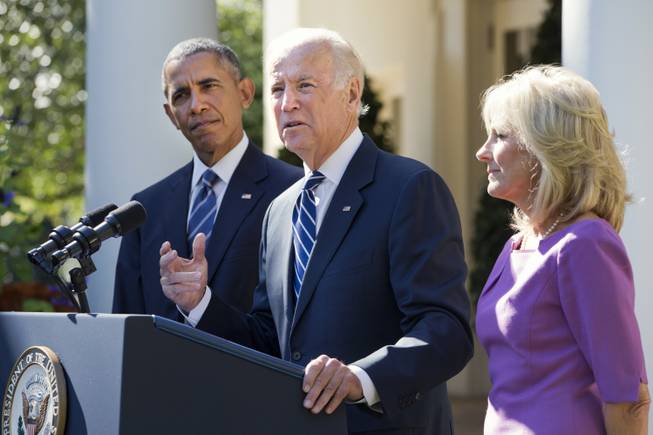
Jacquelyn Martin / AP
Vice President Joe Biden, with his wife Dr. Jill Biden, right, and President Barack Obama announces that he will not run for the presidential nomination, Wednesday, Oct. 21, 2015, in the Rose Garden of the White House in Washington.
Tuesday, Feb. 23, 2016 | 12:01 a.m.
WASHINGTON — As a senator more than two decades ago, Vice President Joe Biden argued that President George H.W. Bush should delay filling a Supreme Court vacancy, should one arise, until the presidential election was over, and that it was “essential” that the Senate refuse to confirm a nominee to the court until then.
Biden’s words, though uttered long ago, are a direct contradiction to President Barack Obama’s position in the battle about naming a successor to Justice Antonin Scalia.
Obama has said it is his constitutional responsibility to name a successor to Scalia, who died Feb. 13 at the age of 79. The president has reacted with incredulity to the suggestion by several Republican presidential candidates and senators, including Sen. Mitch McConnell, R-Ky., the Senate majority leader, that the decision should wait until after Obama has left office.
“Historically, this has not been viewed as a question,” Obama said last week. “There’s no unwritten law that says that it can only be done on off years — that’s not in the constitutional text.”
But in a speech on the Senate floor in June 1992, Biden, then the chairman of the Judiciary Committee, said there should be a different standard for a Supreme Court vacancy “that would occur in the full throes of an election year.” The president should follow the example of “a majority of his predecessors” and delay naming a replacement, Biden said. If he goes forward before then, the Senate should wait to consider the nomination.
“Some will criticize such a decision and say that it was nothing more than an attempt to save a seat on the court in hopes that a Democrat will be permitted to fill it, but that would not be our intention,” Biden said at the time. “It would be our pragmatic conclusion that once the political season is underway, and it is, action on a Supreme Court nomination must be put off until after the election campaign is over.”
“That is what is fair to the nominee and essential to the process,” he added. “Otherwise, it seems to me we will be in deep trouble as an institution.”
Biden’s speech came to light on Monday as White House officials said Obama was poring through a thick binder of potential nominees, with an eye toward deciding on his pick within weeks. It quickly became fodder for Republicans who have suggested that the president should wait to name a successor to Scalia, or that the Senate should delay considering one.
Sen. Charles E. Grassley, R-Iowa, the current chairman of the Judiciary Committee, recited portions of Biden’s speech in his own address from the Senate floor on Monday, calling the points that the vice president had laid out “Biden Rules” and saying his point had been: “It’s the principle that matters, not the person.”
“If the president of the United States insists on submitting a nominee under these circumstances, Sen. Biden, my friend from Delaware, the man who sat at a desk across the aisle and at the back of this chamber for more than 35 years, knows what the Senate should do,” Grassley said. “And, I believe, in his heart of hearts, he understands why it must.”
Biden’s remarks were part of a long speech about revising the Supreme Court confirmation process after a tumultuous five-year period that had featured three bitterly contested nominees: William H. Rehnquist in 1986, who received the most “no” votes of any justice until that time; Robert H. Bork, who was rejected by the Senate in 1987; and Clarence Thomas, whose bruising hearings culminated in a vote in 1991 in which he drew even more opposition than Rehnquist had.
“In all likelihood,” Biden said at the time, “we stand at only the halfway point in the remaking of the Supreme Court, with as many confirmation controversies in the coming presidential term as we saw over the past two terms combined.”
Hours after archival C-Span video clips of the speech began circulating, Biden issued a statement saying that his remarks had been misinterpreted, and stressing that he believed, then and now, that the White House and Congress should “work together to overcome partisan differences” on Supreme Court nominations. He had a record of moving such candidates during his time as chairman of the judiciary panel, he said.
“Some critics say that one excerpt of my speech is evidence that I oppose filling a Supreme Court vacancy in an election year,” Biden said. “This is not an accurate description of my views on the subject.”
Officials at the White House and on Capitol Hill noted that Biden had also said in the 1992 speech that he would support a future Supreme Court nominee by Bush as long as the president consulted with the Senate or chose a moderate. Biden made that observation as he discussed how the confirmation process could be changed “in the next administration,” should he remain as chairman.

Join the Discussion:
Check this out for a full explanation of our conversion to the LiveFyre commenting system and instructions on how to sign up for an account.
Full comments policy